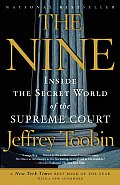
| Publisher: | Anchor |
| Copyright: | 2007, 2008 |
| Printing: | 2008 |
| ISBN: | 1-4000-9679-0 |
| Format: | Trade paperback |
| Pages: | 411 |
Subtitled Inside the Secret World of the Supreme Court, The Nine is legal analyst Jeffrey Toobin's history and profile of the recent Supreme Court. It covers roughly the last thirty years, with special attention to the period between George H.W. Bush and the end of George W. Bush's presidency, profiling each of the members of the Rehnquist court plus Roberts and Alito. It also covers major decisions in that time period, including but definitely not limited to Bush v. Gore.
This is partly a legal history, but it's even more a look into how the Supreme Court functions and decides cases, how politics affect it, and how the justices persuade or fail to persuade each other. It's a fascinating look inside a deliberative process that's notoriously publicity-averse.
Supreme Court deliberations involve much less in-person discussion or contact than one might assume. The justices are surprisingly isolated from each other, meeting only weekly for initial voting and assignment of writing decisions and otherwise communicating largely through memos (on paper; most of the court, at least of the justices Toobin discusses, are not comfortable with computers and don't use e-mail). But despite that, and despite some long-standing grudges, Toobin also shows some surprising friendships and some personalities that I wouldn't have expected. For example, Clarence Thomas is one of the more outgoing and cordial members of the court and makes a point of knowing the names of the staff and treating them with friendship and respect. And Rehnquist took great pride in managing the docket and mechanics of the court efficiently and smoothly and was widely respected by the entire court for doing so.
I'm one of those people who watches coverage of Supreme Court decisions and pays careful attention to the summary of arguments and decisions in PBS NewsHour, so the discussion of cases and decisions here was right up my alley. I found Toobin's history and analysis engrossing and enjoyable even knowing the outcome of most cases before he discusses them. He does an excellent job discussing not only the legal context and implications of each case but also using each to tell a story about the evolution of the views on the court. And Toobin is skilled at writing for a popular audience. This is not a dry or ponderous book, even when dealing with fine points of legal history and precedent.
The main political theme Toobin develops through The Nine is the attempt by conservative Republicans to reclaim the Supreme Court from the solidly liberal Warren Court and its legacy, which handed down landmark case after landmark case. This is typified (to the point of the tail wagging the dog) by the attempt to overturn Roe v. Wade (a somewhat later discussion of the Burger court, but involving many of the same justices). Toobin doesn't take any of the history back farther than scattered mentions of the Warren court, but does cover in detail the rise of a conservative faction in law schools, the Reagan appointees, and the hope that the Rehnquist court would start to reverse some of those decisions. He also shows the court's surprising move to the left, with Republican appointees breaking with their party in ways that were not anticipated by those who appointed them.
For me, the two most interesting characters of the story Toobin tells are O'Conner and Souter. The Nine shows O'Conner at the center of the Rehnquist court and goes into considerable detail about how she ended up there, how she reacted to that position, and how her judicial philosophy was built on a strong feel for the sentiment of the center of the country. Souter, by contrast, was at his own odd angle to the court from the beginning, almost a throwback to a different century in how he preferred to live and think.
Toobin does have a personal stance and opinion and it shines through his writing more than one would expect from a work of straight journalism. He tries to present both sides, but it seemed clear that he is strongly opposed to the strict constructionalist view of Constitutional law. I probably share a lot of his views, but at times this was still disconcerting, particularly given that much of the evidence for this book was based on interviews given on the condition they not be attributed. I doubt that Toobin has substantial facts wrong, but enough of a personal stance shows that I would want to read other books from different perspectives before I was sure that I had the whole story of the recent court. But this doesn't diminish The Nine as entertainment and as a valuable start to such study (although if you're a strict constructionalist or a fan of Clarence Thomas, I suspect you'll find this book infuriating).
I thought I knew a fair bit about recent Supreme Court decisions, but I learned a lot from this book, both personalities and legal history. Toobin both clearly explains the implications and impact of decisions and tells great (and sometimes, as with O'Conner and her husband, heart-rending) stories. He humanizes the court, in a way that makes even Bush v. Gore more comprehensible (although still a legal train wreck). It's not a very optimistic book unless you're of the opposite legal-political persuasion from Toobin, given that it closes with Roberts and Alito and another apparently strong shift to the right. But I also came away reassured by the willingness of justices, particularly Kennedy and O'Conner, to have their minds changed and to develop their opinions over time.
Reviewed: 2010-12-29